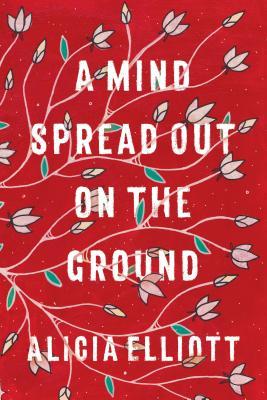A Mind Spread Out on the Ground

When I write about books under the Education tag on my blog, I aim to recommend books I think teachers should read. Often I think these books give useful insights when it comes to teaching for social justice or sustainability. Today's recommendation has the potential to help teachers better understand some of the students in our classes, as well as how racism and settler colonialism permeate our society. For teachers like me, who are white and middle class, this is an essential lesson.
A Mind Spread Out on the Ground is written by Alicia Elliott, a Haudenosaunee woman. Her series of essays cover a lot of ground, recounting parts of her life and discussing issues of identity, growing up in poverty, settler colonialism, mental illness, abuse and more. The essays are complex works, often masterfully linking seemingly unrelated ideas to more fully explore topics. The essays offer windows into other lives, but also help us better consider Canadian society from perspectives that are different from dominant settler narratives.

Elliott's essays are engaging in their own right, but the text is particularly relevant for teachers to read. Scholar Brooke Madden has discussed the need for counterstories in education, meaning stories that run counter to the majoritarian narratives that are dominant. Elliott's essays provide important counterstories that can help teachers better understand the students and families served by our schools.
A frequent topic throughout the book is growing up in poverty. Elliott's essay "Scratch" outlines her family's recurring issues with lice infestations. Hearing about their ongoing struggle from her perspective clarifies the systemic barriers that exist for people living in poverty. For instance, Elliott's family did not have access to running water, nor enough money to afford extra loads of laundry at the laundromat, making fully eliminating the lice difficult. Eventually, her family came to the attention of social services. Looking to keep the family together, her parents schooled her and her siblings on how to interact with social workers. Elliot says, "our parents were far from perfect, but their main barriers to being better parents were poverty, intergenerational trauma and mental illness—things neither social workers nor police officers have ever been equipped to address, yet are both allowed, even encouraged, to patrol" (page 87). Elliott makes the point that social workers often view not being able to afford housing, food and other necessities as the same thing as choosing not to have these things.
Sometimes teachers view students coming from poverty through a deficit lens. This means falsely believing that there is a culture of poverty, viewing parents (or students) who are poor as lazy or assuming that parents who are poor do not care about their kids' education. This type of belief may not be directly expressed, but does affect assumptions teachers make about students. Elliott's work provides an important counterstory of a family trying to stay afloat in a system that is hostile towards them. It is important to keep in mind, particularly due to recent upheavals as families deal with job losses and other stresses as a result of COVID-19.
Combined with Elliott's discussion of poverty is the knowledge that Indigenous families are impacted more heavily, with Indigenous children being five to twelve times more likely to be taken into the foster system. Many of Elliott's essays focus on settler colonialism in Canada. Particularly powerful is her essay called "Dark Matters," which was previously published here. If you haven't had the chance, go read it. She writes about how racism "forms the skeleton of our world, yet remains ultimately invisible, undetectable" (page 70). White teachers should read this essay (and Elliott's other writings) and ask themselves: How is racism invisible to me? Where is it present in my community or school? And, crucially what am I going to do about it?
Teachers, especially white teachers, often do not spend enough time critically examining the assumptions we make about students or the beliefs and ideas that underlie our own actions. Reading counterstories by authors like Alicia Elliott can challenge us to critically consider our assumptions and beliefs, a necessary precursor to getting rid of the deficit lens and challenging the inequities our schools perpetuate.
